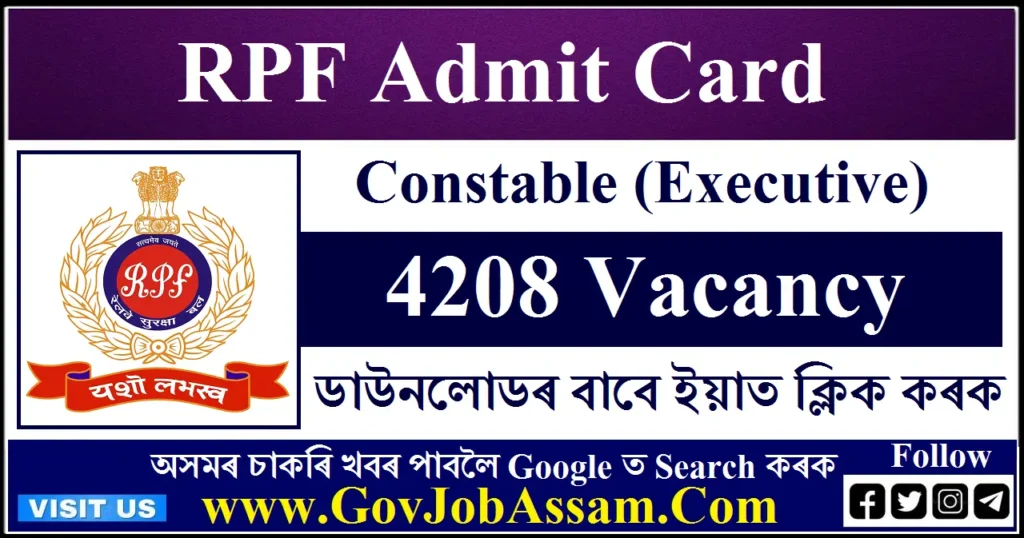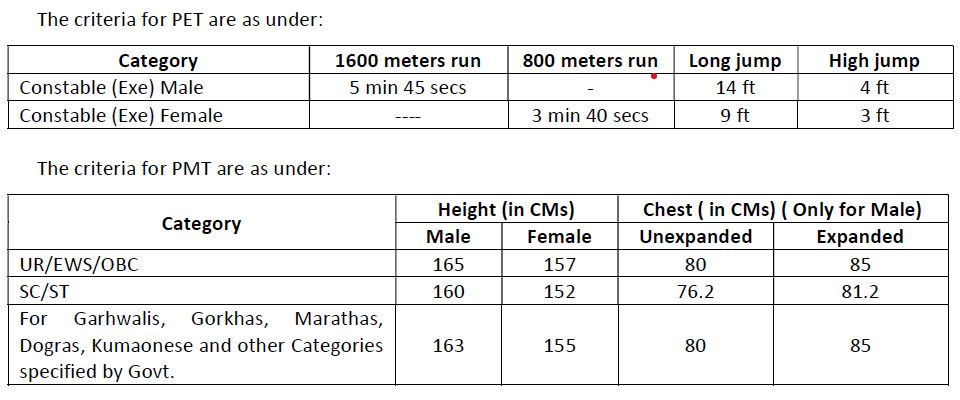Notification
RPF Admit Card 2024
Assam Career: Ministry of Railways, Government of India has released the admit card of Computer Based Test (CBT) for the recruitment of 4208 Posts of Constable (Executive) in Railway Protection Force (RPF) and Railway Protection Special Force. Candidates who applied online for these posts may download the admit card from this page in due course of time. However, as on date, application status of these posts is available now online.

Table of Contents
RPF Admit Card Details
Name of post: Constable (Executive)
Name of organisation: Railway Protection Force (RPF) and Railway Protection Special Force
Number of Vacancy: 4208 Posts
- Male: 3577 posts
- Female: 631 posts
Advertisement No: CEN No. RPF 02/2024
Type of exam: Computer Based Test (CBT)
Mode of exam: Online
Date of exam: To be updated
Admit card status: Not Released
Admit card release date: To be updated
Related Article: RRB Guwahati Admit Card
How to Download RPF Admit Card?
Candidates who submitted online applications for 4208 Constable Posts in Railway Protection Force (RPF) and Railway Protection Special Force may download their CBT Admit Card online. They may follow below mentioned steps.
| ➥ Scroll down, Check Important Web Link’s section. |
| ➥ Click on RPF Admit Card link. |
| ➥ A new webpage will be opened, enter your Registration Number, Date of Birth and click on Login button . |
| ➥ Your RPF Admit Card 2025 will be available. |
| ➥ Take a print of the same and carry the admit card to the exam hall. |
Important Web-Links of RPF Admit Card
| RPF Admit Card | Coming Soon |
| Check Application Status | Click Here |
| View official Advertisement | Click Here |
| Official Website | Click Here |
Selection Process of RPF SI Recruitment
The recruitment process of Constable posts under Railway Protection Force (RPF) shall comprise of the following stages:
(i) Computer Based Test (CBT)
(ii) Physical Efficiency Test (PET)/ Physical Measurement Test (PMT)
(iii) Document Verification (DV)
Computer Based Test (CBT)
Name of exam: Computer Based Test (CBT)
Date of exam: To be updated later
Mode of exam: Online (CBT)
Duration of exam: 90 minutes
Total no. of questions: 120
Type of questions: Multiple Choice Question
Standard of questions: The standard of examination will be Graduation level.
Negative marking: There shall be negative marking @1/3rd marks for each wrong answer.
Pass marks: Minimum pass percentage for eligibility: UR, EWS and OBC-NCL – 35%, SC & ST – 30%
Normalization: Normalization of marks will be done for CBTs held in multiple shifts.
Medium of examination: Questions for CBT will be available in English, Hindi and 13 regional Indian languages (viz., Assamese, Bengali, Gujarati, Kannada, Konkani, Malayalam, Manipuri, Marathi, Odia, Punjabi, Tamil, Telugu and Urdu). Accordingly, candidates must choose their medium of examination from any one amongst those listed in the ONLINE application form. CBT questions will be displayed in the language opted and in English.
Syllabus for CBT
Questions are likely to cover topics pertaining to the following syllabus.
➲ Arithmetic (35 marks): Questions on Number System, Whole Numbers, Decimal & Fractions and relationship between numbers, fundamental arithmetical operations, Percentages, Ratio & Proportion, Averages, Interest, Profit & Loss, Discount, Use of Tables & Graphs, Mensuration, Time & Distance, etc.
➲ General Intelligence and Reasoning (35 marks): Questions on Analogies, Similarities and Differences, Spatial Visualization, Spatial Orientation, Problem Solving Analysis, Judgement, Decision Making, Visual Memory, Discriminating observation, Relationship concepts, Arithmetical Reasoning, Verbal & Figure classification, Arithmetic number series, Non-verbal series, Coding and Decoding, Statement- Conclusion, Syllogistic reasoning, etc.
➲ General Awareness (50 marks): Questions will be aimed at testing the candidate’s general awareness of the Environment around him/her and its application to society; to test knowledge of current Events and such matters of everyday observation and experience as may be expected of any educated person. The test will also include questions relating to Indian History, Art and Culture, Geography, Economics, General Polity, Indian Constitution, Sports, General Science, etc.
Physical Efficiency Test (PET)/ Physical Measurement Test (PMT)
Candidates shortlisted on the basis of their performance in CBT shall be called for Physical Efficiency Test (PET), Physical Measurement Test (PMT) & Document Verification (DV) to the extent of 10 times the number of vacancies in each category for Male/Female/Ex-Servicemen as per merit.
Ex-servicemen shall be exempted from PET, however, they will have to undergo PMT.
In case requisite candidates from the above shortlisted candidates do not qualify in PET/ PMT, and there is a shortfall in any category/Group of Male/Female/Ex-Servicemen, additional candidates to the extent of 10 times the shortfall will be called for PET/ PMT for a second round of PET/ PMT as per their merit in CBT. There shall be a maximum of two rounds of PET/ PMT. If vacancies of Female and Ex-servicemen are not filled up after second round of PET/ PMT, vacant posts will be filled up by Male candidates of respective category.
Passing Physical Efficiency Test (PET) is mandatory and the same will be qualifying in nature. No marks are to be awarded.

Document Verification (DV)
Based on the performance of candidates in the CBT and subject to their qualifying in PET & PMT, candidates shall be considered for Document Verification.
Candidates who do not appear for Document Verification will not be considered in the final selection, irrespective of their performance in CBT and PET/PMT.
Candidates shortlisted for DV will have to submit all their original documents along with two sets of self-attested photocopies at the time of DV.
Further, these candidates should upload the scanned copies (in true colour) of Photo & Signature before their DV date through the portal – https://oirms-ir.gov.in/rrbdv.
No additional time will be given to the candidates who are not producing their original certificates on their date of DV and the candidature of such candidates is liable to be forfeited.